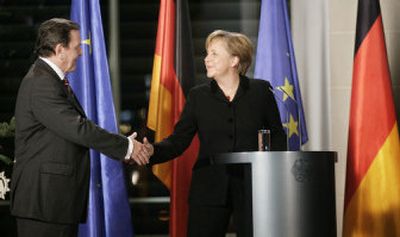With no fanfare, Merkel takes charge in Germany

BERLIN – A pastor’s daughter known for her steely ambition, Angela Merkel capped a remarkable rise through German politics Tuesday by becoming the nation’s first female chancellor and the first to have grown up in the then-Communist east.
The 51-year-old conservative, the youngest person to reach the chancellor’s office, will lead Europe’s largest economy as head of a fragile coalition that faces high unemployment, low growth and the need to reform the welfare state. Less a charismatic campaigner than a sober tactician, Merkel is expected to rely on her gifts of persuasion to keep the government from splintering along party lines.
“I swear I will dedicate my efforts to the well-being of the German people,” said Merkel, leader of the Christian Democratic Union, who raised her right hand and read the oath of office in Parliament. “So help me God.”
The scene was unceremonious and businesslike, much like the chancellor’s brief yet stunning political career. A physicist raised in an East German farm town, Merkel did not begin her political resume until 1989, the year the Berlin Wall fell. Known for her shrewdness and analytical decision making, she quickly rose through the ranks of the CDU and was credited for an intellectual rigor that sometimes made her appear aloof.
“This is a strong signal for many women and surely for some men, too, ” Norbert Lammert, president of the Parliament, told Merkel after legislators voted 397-202 to name her chancellor to replace Gerhard Schroeder.
Her ascension followed two months of contentious negotiations between the CDU and the left-leaning Social Democrats to form a coalition government after neither party won a clear majority in September’s election.
The government’s immediate challenges are to shrink an 11 percent unemployment rate and reduce social programs that account for 48 percent of the national budget. The coalition has agreed to the outlines of such a plan, but vast differences remain over Germany’s hallowed vision of social democracy.
Such domestic fragility is not deterring Merkel from moving quickly on foreign affairs. She leaves today for Paris to meet with President Jacques Chirac and then to Brussels, Belgium, for talks with NATO and European Union members. She is expected early next year to visit President Bush in Washington in an effort to repair relations damaged by Schroeder’s vigorous opposition to the Iraq war.
“Merkel will bring a change in atmospherics between the U.S. and Germany,” said Gunther Hellmann, a political analyst at Johann-Wolfgang-Goethe University in Frankfurt. “She will find a new consensus on foreign policy. But she won’t send troops to Iraq. Even the U.S.’s other European allies want to get out of Iraq. So how could this coalition government convince the German public to send soldiers?”
In taking office, Merkel has become the first woman since former British Prime Minister Margaret Thatcher to lead a major industrialized nation.
Born in Hamburg, she was less than a year old when her father, Horst Kasner, a Lutheran pastor, moved the family east to Templin.
In her high school years, Merkel focused more on science and mathematics than on politics. And like many of her East German classmates, she enrolled in the Communist Young Pioneers not for ideological reasons but to improve her chances of being accepted at Leipzig University. Merkel’s political awakening began in 1989 when she acted as spokeswoman for a fledgling democratic organization.
As a new CDU member in 1990, she impressed then-Chancellor Helmut Kohl during the early days of German unification. He appointed her the nation’s environmental minister.
She was married and divorced in the 1980s and has since been re-married to leading German chemist Joachim Sauer.